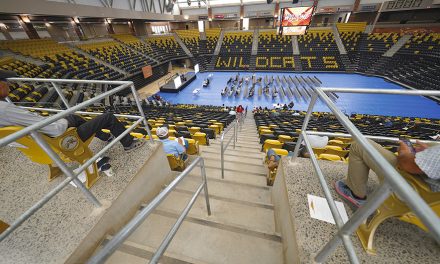
Church land-use regulations raise concerns
GALLUP
On Tuesday, the Resources and Development Committee discussed church land-use regulations and proposed changes.
The committee met with the Navajo Nation Land Department.
The proposed changes include simplifying and speeding up the permitting process for mission-site applications, updating the application to coincide with with general leasing regulations that were approved in 2013, and eliminating the cost for the permitting process.
Steven Chischilly, environmental specialist, said sometimes an environmental assessment can cost up to $3,000, even for an existing mission-site permit of one acre.
“This (regulations) will give homes and local churches more possessory interests over the land on which the church is permitted,” Chischilly said. “By doing so we will give churches more time to be in compliance. Ten years will give them a lot more possessory interest.”
Currently, the timeline for a mission-site permit is five years and the proposal would increase that to 10 years.
Chischilly said 10 years will allow permit holders to invest in the church, in the home and in the home-church area for which they are applying.
All documents currently needed for a mission-site is a branch off of what was previously instituted for the past 40 years by the BIA.
The documents can be very intense and hard to convey to some people, Chischilly said.
The regulations would change this process by making it not as intense and reducing it to about eight steps.
The steps being omitted are the environmental assessment, findings of no significant impact, appraisal process, and sanitation requirement consultation.
“To boil it down to more or less what is required for a general ground lease or a land withdrawal designation,” Chischilly said.
What would be needed for a mission site would eventually be the application, dependency consent, survey plot, chapter resolution, petition of names, articles of incorporation, biological resources compliance form and cultural resource compliance form.
Delegate Kee Allen Begay voiced concern about placing larger church organizations together with small Navajo church families.
“Why are we blanketing this bigger organization’s policy onto a Navajo family, maybe it’s just a family church as well, or maybe it’s just something that they utilize for a certain purpose,” he said. “I mean a lot of them maybe even have a hard time paying their bills as well.”
He said RDC really needs to look at and distinguish the small family churches from bigger organization churches that want to do religious activity on the Nation.
Begay also questioned what churches are contributing to the community since he knows of churches that charge Diné to bury loved ones in cemeteries or for funerals.
“That’s the reason why I’m asking all these church organizations, headquarters, what is their real commitment to the community aside from their doctrine and religious purpose?” he said.
“On the side,” he said, “they still have some social responsibility. How do they help the community? How do they help improving the community?”
Delegate Edmund Yazzie’s concern revolves around local pastors.
“Pastors have been asking about their lease, they are worried,” Yazzie said. “We have one elder pastor that is, in his statement, ready to go home to be with the lord.
“But he is worried about the church lease because he wants the lease to be valid and he wants the mission to continue on,” he said.
Yazzie pleaded with the committee to to move forward with the legislation on behalf of these pastors since this issue has been debated for the past four years.
“It’s been way too long, ever since Walter Phelps was on the Council, and so that’s almost four years ago,” Yazzie said. “I remember Speaker (LoRenzo) Bates wanted to finalize all these legislations before this Council came in but we fell short.”
There are currently no moves to include these regulation changes on an official resolution. RDC is planning a meeting with church officials and residents across the Nation.







 Highway 264,
Highway 264, I-40, WB @ Winslow
I-40, WB @ Winslow